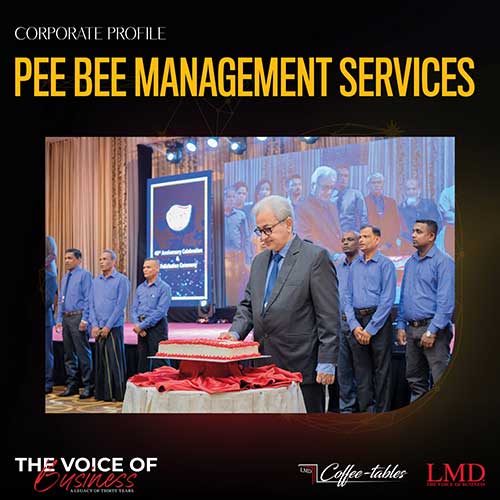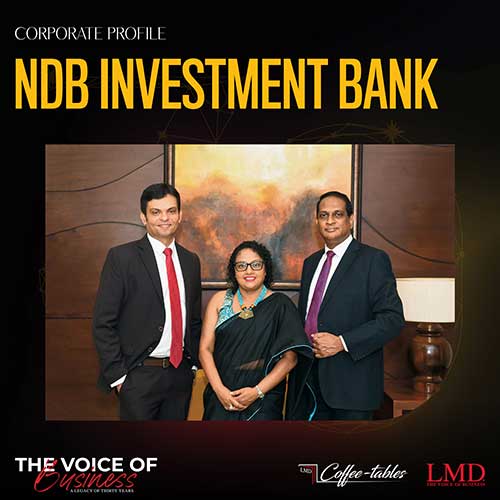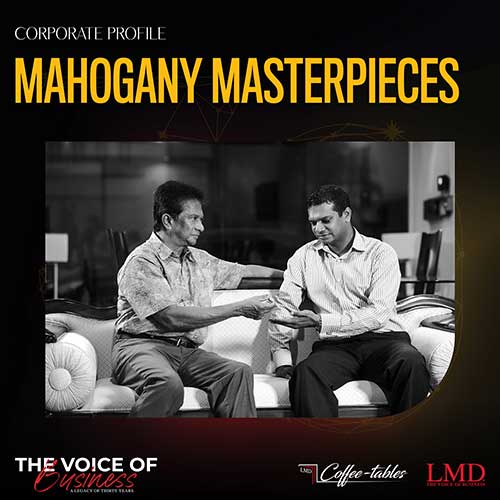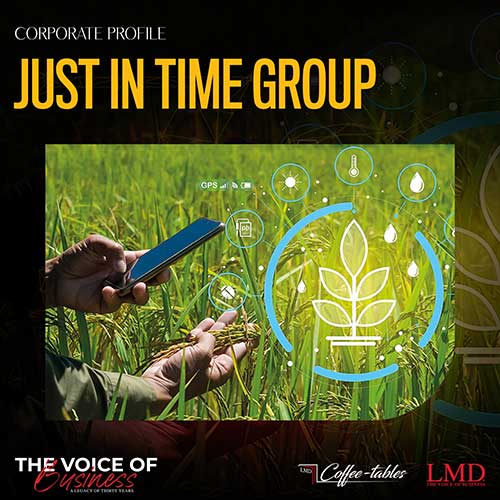REFLECTIONS
FROM THE THIRD DECADE
A selection from LMD’s Cover Stories
JANUARY 2019
CAN WE RUN A NEW RACE?
Wijith DeChickera wonders how Sri Lanka can make the most of its democratic heritage and believes there has to be a major paradigm shift in the state of politics

Demonstrably South Asia’s oldest democracy with an extra feather in its cap by virtue of universal franchise as early as in 1931. Arguably the most embattled republic in the region – beleaguered by civil war, and insurgencies and insurrections, in 71 years of independence.
Between the extremes of great potential as a democratic -republic and grievous pain for its people, our island race taken as a whole – for that is how we’re best taken – has swung like a chronic pendulum.
CHEQUERED CAREER But the most recent episode in our country’s chequered career might well be its most egregious to date. It was the best of times; it was the worst of times.
On the one hand, an unlikely coalition between neoliberal neoconservatives and a stalwart from the previous authoritarian regime in an increasingly turbulent marriage of convenience to stave off the return of an erstwhile anti-democratic ethos.
And on the other, rabble-rousing chauvinists in opposition snapping at the heels of a divided house in wars of attrition to undermine the reform agenda.
Then the so-called stalwart (can the leopard change its spots?) pulled the pin. Sri Lanka juggled the live grenade for some seven weeks.
MIND-BOGGLING COST A president who arbitrarily sacks one prime minister and appoints another… one who was his former president. And he not only precipitately prorogued parliament but also refused to heed a series of ‘floor tests’ to discern the will of a majority in the legislature. A hooligan house in chaos with a visibly tired speaker battling on! The jury was out until 13 December when the Supreme Court ruled that the dissolution of parliament was unconstitutional.
Of course, the cost to a sitting pretty island nation’s image, constitutionalism and economy has been mind-boggling to say the least.
The West wept over us openly while covertly agitating for a stable government. A rising Eastern powerhouse looked set to slush fund another former beauty into its ‘string of pearls.’ To the north, Big Brother was watching us – ominously silent and wondering whether the teardrop isle of the Indian Ocean will have the fortitude to opt for the route taken by the Maldives vis-à-vis China or go ballistic like Gwadar in troubled Baluchistan in Pakistan.
Be these global political ramifications as they may, the economic picture is pretty bleak too. The rupee plummeted to a new record low and losses in investment have been estimated at Rs. 30 billion. And Moody’s pointedly lowered Sri Lanka’s country rating for the first time since 2010.
In addition to the US, Japan and IMF suspending aid or funding pending further clarity of the political situation, there’s the -lamentable injury to the ‘prettiest girl on the beach.’
In 2019, Lonely Planet said our blessed isle would not only be the best but the most beautiful place to be. No longer. We can kiss that touristic holiday goodbye. Until? Unless! Until the president suspends naked ambition and settles for being a one term executive who will then possibly be remembered more kindly by posterity than now.
COMPROMISED HOUSE And a former president can content himself with passing on his legacy to his scions in their due time and not prematurely by dint of a coup. Plus a compromised house can set its affairs in order through a host of reforms much needed in our parliamentary system. In addition to which, the supposedly sea-green incorruptible previously ousted and now reappointed premier needs to make way for the next generation.
FIVE ESTATES (NOT THREE OR FOUR) In a liberal democracy, there are three recognised arms of government. First, the legislature (parliament) where laws pertaining to the land are mooted and debated inter alia. Then the judiciary, which interprets those laws and makes rulings on how to interpret them. And last but not least, the executive – including both government and opposition – that shapes policy to practically implement laws made and passed.
There is a fourth estate – the free media – that traditionally plays the role of watchdog, critic and commentator: reporting news and recommending correctives in response to the three arms of house, court and state.
However, in nearly 71 years since independence, the press – and now new media – has swung between blatant compromise with the powers that be and craven opportunism in pursuit of their own agendas from business to politics.
Therefore, it is high time for a fifth column…
A broad association of institutions and establishments to begin critically engaging the four estates of our democratic ‘socialist’ republic. Eschewing all partisan affiliations, this segment of the body politic must start building values, norms and mores from the bottom up – where a top-down approach appears to have failed.
Therefore, it is imperative that the fabric of society accommodate the warp of media and woof of civil society. This might be the last bastion against the fall of night whereby authoritarian -anti-democratic forces threaten to rape the republic.
FAMILY ET AL TO THE FORE In our country, politicians have -often unconscionably fallen back on the conventional wisdom that ‘the voice of the people is the voice of a god.’ This has led, time and again unfortunately, to unscrupulous political parties sans a genuinely pluralist ethic hijacking the people’s will.
The majoritarian politics that results is an environment where nationalism, jingoism, chauvinism and a host of other nasty ‘isms’ can flourish – to the national detriment.
As a future safeguard against such a despicable exceptiona-lism or ethnic particularity, it is incumbent on civil folk to start re-envisioning a whole new Sri Lanka. If only thought and opi-nion shapers from the liberal and moderate segments of society would unite in a concerted effort, we can aspire to tear down strongholds, and build new bases and bridges to span the gap between classes of people, perceived divisors such as caste and creed, and communal exclusivity.
Such inclusion would result in a brand-new modernist and plural nation state.
To do this effectively, liberal legislators as much as more mode-rate elements of the executive must reach out to educators, -influencers and leaders of diverse communities, to shape a truly pluralistic and inclusive society.
Such a brave new world would enjoy ethnic, cultural and religious pluralism. But it must also begin to privilege the positive influences of family and other associational institutions in civil -society. As long as these are fair, balanced, impartial, nonpartisan, normative from human and civilisation perspectives, and above all law-abiding.

DEMOCRACY ON EDGE Political turmoil has rocked the -nation since 26 October against a backdrop of multiple presidential -decrees, U-turns, rowdy scenes in parliament, political horse-trading… and popular protests – so much for ‘So Sri Lanka’!
On that fateful day of 26 October 2018 – yes, a Friday – came the news that Sri Lanka’s executive president had deposed the incumbent prime minister and appointed a new premier (a onetime political ally turned foe no less). And a day later, the president announced that parliament would be prorogued.
To say all of this came as a shock to the citizenry would be an understatement like no other. Moreover, for the first time in its history, Sri Lanka grabbed the international headlines for having not one but two prime ministers at the same time!
While instigating political turmoil and drawing -international criti-cism, the move resulted in Ranil Wickremesinghe, who claimed a majority in parliament, and opposition parties refusing to recog-nise Mahinda Rajapaksa as prime minister – and insisting that President Maithripala Sirisena’s actions were unconstitutional.
Having formed a new cabinet of ministers with Rajapaksa that was hotly contested in the house, the president dissolved parlia-ment on 9 November, which led to the United National Party (UNP) declaring the move as being unconstitutional. Subsequently, with submissions made by both sides of the political -divide, the Supreme Court stayed the president’s dissolution -until 7 December – and ruled that it was unconstitutional five days later.
But this was by no means the end of the saga that some have called a ‘bloodless coup’ and others used as a rallying cry to ‘let them vote.’
We’ve also witnessed the trashing of parliament involving brute force, a butter knife (or a letter opener, depending on whom you ask), and a concoction of chilli powder and water (or a carbo-nated beverage, in the words of others) literally being thrown into the mix – in addition to a host of other similarly unsavoury behaviours unbefitting of that most hallowed house designed by the highly respected local architect Geoffrey Bawa – he must surely be turning in his grave.
At the same time, there is a sense that more members of -society at large are taking a closer look at the constitution and its stipulations vis-à-vis who calls the shots in the highest echelons of power.
And as witnessed by the spontaneous protests that erupted in Colombo and elsewhere in and around the island, the people seem to be making their voices heard – on the streets, across media channels – including the online world where such have been both loud and clear – and in everyday discussions.
For far too long, democracy in Sri Lanka has been an excuse for a mere vote buying exercise. Perhaps now, with the changes on the ground, we may all realise the impact of our words and actions on the governance of the nation that we call ‘home.’
Only time will tell.





